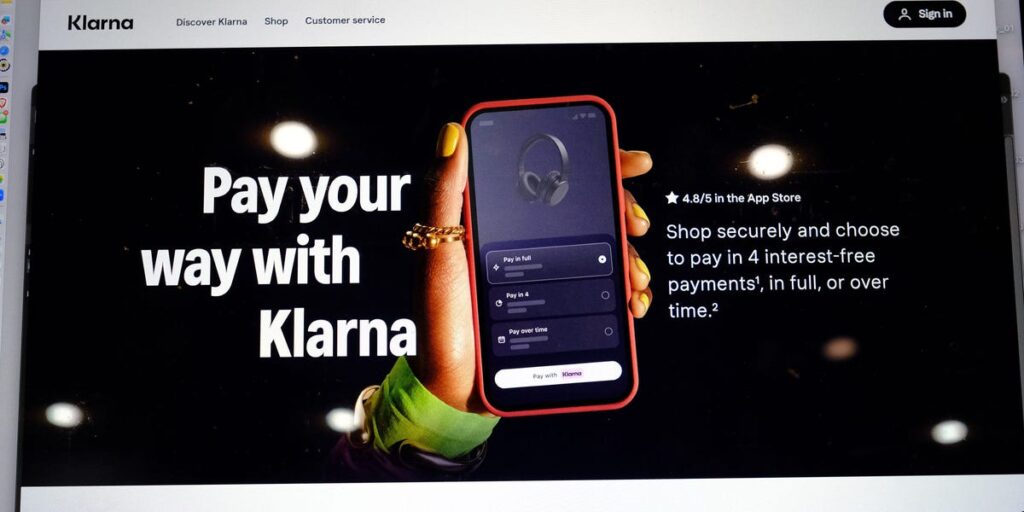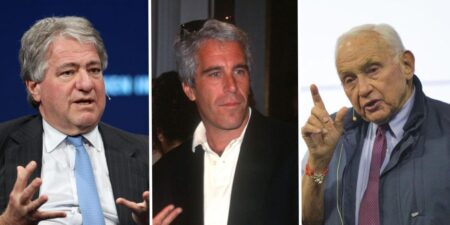Two decades after its founding, Klarna has gone public, and its investors are finally seeing a windfall.
The Swedish “buy now, pay later” company listed on the New York Stock Exchange on Wednesday. Its stock popped 30% on its debut, jumping above its $40-per-share IPO price to $52 a share.
That IPO price gave Klarna a $15.1 billion valuation and netted Klarna $1.37 billion. Per Pitchbook, Klarna had raised $3.85 billion in its history before the public listing.
Klarna’s IPO has been a long time coming. Founded in 2005, the consumer payments company first hinted at an IPO in 2019, telling Bloomberg it could go public in the next one to two years. Klarna had reportedly planned to go public earlier this year, but delayed its IPO efforts after Trump’s Liberation Day tariffs roiled the markets.
It’s the first major IPO of the fall and is expected to be one of many companies to take the public market plunge before the end of the year. Gemini Space Station, a crypto exchange backed by the billionaire Winklevoss twins, is expected to go public later this week, and 25-year-old ticket marketplace StubHub launched its IPO roadshow Monday.
Klarna’s IPO price represents a major markdown from its peak valuation, however. The company raised $639 million in 2021 at a $45.6 billion valuation, but slashed its valuation a stunning 85% to $6.7 billion the next year as the fintech sector stumbled on rising interest rates and worsening investor sentiment.
Klarna chairperson and former Sequoia Capital Michael Moritz criticized the company’s other investors at the time.
“The shift in Klarna’s valuation is entirely due to investors suddenly voting in the opposite manner to the way they voted for the past few years. The irony is that Klarna’s business, its position in various markets, and its popularity with consumers and merchants are all stronger than at any time since Sequoia first invested in 2010,” Moritz said in a press release about the round. “Eventually, after investors emerge from their bunkers, the stocks of Klarna and other first-rate companies will receive the attention they deserve.”
Klarna debuts on the US market facing a number of headwinds, including regulatory risks and widening losses as the company sets aside more capital to cover potential losses if its customers don’t pay back their loans.
It’s been making changes to its operations, too. Klarna will require many of its previously remote employees to return to the office three days a week beginning at the end of September, in part due to Klarna losing talent to firms that prioritize in-person working, Business Insider reported last week. Klarna is also redirecting multiple employees to customer support positions after previously restructuring the business to prioritize AI chatbots handling its customer service.
Klarna declined to comment for this story.
We used Klarna’s share price at Wednesday’s market close, $45.82, to determine the value of its major shareholders’ stakes after the listing.
We’re including the 15 shareholders with the largest stakes after Klarna’s IPO. Venture firm IVP, Ant Group, and Harvest Growth Capital, other investors in Klarna listed in its IPO filing, were among the top 15 shareholders prior to Klarna’s IPO, but sold enough shares in the listing to fall in the rankings. Our calculations included any extra shares that shareholders offered to meet higher investor demand.
Now that Klarna is public, here’s what those top 15 shareholders’ stakes are worth.
Sequoia Capital, an investor: $3.5 billion
Venture capital giant Sequoia Capital is the biggest benefactor of Klarna’s IPO. The San Francisco-based firm Sequoia owned 78.8 million shares, or about 20.1% of the company, after its IPO.
Sequoia first invested in Klarna in 2010, leading the company’s $9 million fundraise and contributing additional capital over numerous rounds in the following years.
Former Sequoia partner Michael Moritz joined Klarna’s board of directors at the firm’s 2010 investment and became the chairperson of the board in 2020.
When Moritz stepped down from his investing position in 2023, Sequoia partner Matthew Morris joined Klarna’s board to represent the firm. The following year, Morris, with Sequoia’s backing, reportedly attempted to remove Moritz from the board altogether. After facing pushback from Klarna CEO Sebastian Siemiatkowski, Morris withdrew the attempt and stepped down from the board. Sequoia partner Andrew Reed took his place. Moritz remains Klarna’s chairperson today.
“It’s amazing what an iron-willed CEO like [Sebastian Siemiatkowski], an enduring value prop, a team of true believers, and 20 years of steady (ish?) compounding can create,” Reed posted on X Wednesday morning.
Sequoia bought an additional 7.33 million shares in Klarna between July 2022 and March 2023 for $135 million, according to Klarna’s IPO filing.
Sequoia sold 2.14 million shares in Klarna’s IPO, which at its $40-per-share IPO price netted the firm $85.6 million.
At a $45.82 closing share price, Sequoia’s remaining stake is worth about $3.5 billion.
Victor Jacobsson, cofounder: $1.38 billion
Klarna cofounder Victor Jacobsson owned about 30 million shares of Klarna, or 8% of the company after its IPO.
Jacobsson founded Klarna in 2005 alongside Sebastian Siemiatkowski and Niklas Adalberth. He served as the company’s CFO until 2012, when he left.
Jacobsson and Siemiatkowski, Klarna’s CEO and the only cofounder who remains an executive at the company, have reportedly clashed in private for years over key governance decisions at Klarna, like how and when the company should go public.
Jacobsson has amassed a large stake in Klarna over the years, including by buying up shares in secondary markets through various holding companies, the Financial Times previously reported.
Between July 2022 and March 2023, Jacobsson bought 3,969,192 shares of Klarna for a total of $73 million across four different holding companies, per Klarna’s IPO filing.
Jacobsson sold about 1.3 million shares in Klarna’s IPO, which at a $40-per-share IPO price would’ve netted him about $52.1 million.
At a $45.82 share price, Jacobsson’s remaining stake is worth about $1.38 billion.
Heartland A/S, an investor: $1.36 billion
Heartland A/S, the investment holding company owned by Danish billionaire Anders Holch Povlsen, owned about 37.1 million shares of Klarna, or about 7.8% of the company after its IPO.
Heartland first invested in Klarna in 2017 via Brightfolk A/S, another of Holch Povlsen’s holding companies. That investment included shares bought from existing Klarna investors such as private equity firm General Atlantic and cofounder Niklas Adalberth.
Heartland CEO Lise Kaae sits on Klara’s board of directors.
The firm sold about 7.4 million shares in Klarna’s IPO, or about 20% of its stake. At a $40-per-share IPO price, that sale brought in about $297 million.
At a $45.82 share price, Heartland’s remaining stake is worth about $1.36 billion.
Sebastian Siemiatkowski, cofounder and CEO: $1.17 billion
Sebastian Siemiatkowski, Klarna’s CEO and cofounder, owned 25.6 million shares of Klarna, or about 6.8% after its IPO.
Siemiatkowski began building Klarna alongside his cofounders at age 23, while he was getting his master’s degree at the Stockholm School of Economics. The company, initially named Kreditor and rebranded to Klarna in 2010, sought to allow customers to pay for their purchases after delivery.
Siemiatkowski was estimated to be a billionaire in early 2022, with his net worth peaking at roughly $3.2 billion after Klarna raised a funding round the previous year at a $45.6 billion valuation. The company’s fundraise in July 2022, however, valued Klarna at $6.7 billion, knocking Siemiatkowski off the billionaire pedestal.
Klarna paid $16.5 million to nonprofits founded by Siemiatkowski’s wife, including through donations and partnerships, over the last five years, BI reported last week.
Siemiatkowski purchased an additional 3.06 million shares of Klarna for $56 million between July 2022 and March 2023. He’s the only major shareholder on this list who didn’t sell any of his shares in Klarna’s IPO.
At a $45.82 price, his stake is now worth about $1.17 billion.
Commonwealth Bank of Australia, an investor: $798 million
The Commonwealth Bank of Australia owned about 19.3 million shares of Klarna, or about 4.6% of the company after its IPO.
CBA, the largest bank in Australia by total assets, first invested $100 million in Klarna in 2019. It’s also backed Anthropic, announcing an investment in the AI startup giant in March.
CBA invested an additional $200 million in Klarna in 2020, bringing its stake to 5.5%.
As part of its investments in Klarna, CBA received 50-50 ownership rights with Klarna to Klarna’s Australian and New Zealand business.
CBA bought an additional 1.8 million shares in Klarna between July 2022 and March 2023, according to Klarna’s IPO filing, for an aggregate price of $32 million.
CBA sold about 1.9 million shares in Klarna’s IPO, which at the $40-per-share IPO price would’ve brought in $77.4 million.
At a $45.82 share price, its remaining stake is worth about $798 million.
Silver Lake, an investor: $663 million
Private equity firm Silver Lake owned 17 million shares of Klarna, or about 3.8% of the company after its IPO.
The Silicon Valley-based firm’s other tech bets include fintech darling Stripe, business-management software company Airtable, and weight-care app Noom.
Silver Lake led Klarna’s $650 million fundraise in 2020, which valued the company at $10.6 billion.
The firm sold about 2.6 million shares in Klarna’s IPO, netting it $102 million at a $40 IPO share price.
At $45.82 a share, Silver Lake’s remaining stake is worth about $663 million.
GIC, an investor: $236 million
Singaporean sovereign wealth fund GIC Private Limited owned about 6.3 million shares of Klarna, or about 1.4% after its IPO.
The fund manages Singapore’s foreign reserves in more than 40 countries. It’s also invested in Anthropic, contributing to its September $13 billion Series F fundraise at an $183 billion valuation.
GIC invested in Klarna’s $650 million round in 2020 at a $10.6 billion valuation.
The fund sold about 1.2 million shares in Klarna’s IPO, netting it $46.9 million at a $40 IPO share price.
At a $45.82 share price, GIC’s remaining stake is worth about $236 million.
HMI Capital, an investor: $204 million
San Francisco-based investment firm HMI Capital owned about 5.6 million shares in Klarna, or about 1.2% of the company after its IPO.
HMI Capital manages about $3.22 billion in assets, primarily making investments in public companies including Roblox, Flutter Entertainment, and SailPoint.
The firm first invested in Klarna in 2019, contributing to its $460 million fundraise. HMI Capital put more money into the company in its 2020, 2021, and 2022 raises.
“From the outset, we believed that their vision of buy-now-pay-later offers a cheaper, friendlier alternative to credit cards. Klarna has proven that by welcoming over 110 million active consumers to its platform,” said Justin Nyweide, founding partner and CIO of HMI Capital, in a statement to BI. “We particularly want to congratulate CEO Sebastian Siemiatkowski, Chairperson Michael Moritz and CFO Niclas Neglén for successfully bringing Klarna to market in a turbulent time. We are proud to partner with them and can’t wait for Klarna to tackle the immense growth opportunity in front of them.”
HMI Capital sold 1.1 million shares in Klarna’s IPO, which at a $TK IPO price would’ve brought in $44.5 million.
At a $45.82 share price, its remaining stake is worth about $204 million.
BlackRock, an investor: $194 million
BlackRock owned nearly 6 million shares of Klarna, or about 1.1% of the company after its IPO.
BlackRock has invested hundreds of billions of dollars in Big Tech giants including Nvidia, Microsoft, and Apple. It’s also backed AI data processing startup Databricks, which announced a $1 billion fundraise this week at a $100 billion valuation.
The firm first invested in Klarna in 2019, contributing to its $460 million fundraise, and putting more capital into the company in its 2020 and 2021 raises.
BlackRock sold about 1.7 million shares in Klarna’s IPO. At a $40 IPO share price, that sale would’ve netted the firm $68.5 million.
At a $45.82 share price, BlackRock’s remaining stake is worth about $194 million.
UBS O’Connor, an investor: $148 million
UBS O’Connor owned about 4.5 million shares in Klarna, or about .9% of the company after its IPO.
UBS O’Connor is an alternative investment unit within UBS Asset Management. Per Klarna’s IPO filing, its Klarna investment is held in the Nineteen77 funds that UBS manages.
It’s not clear when UBS O’Connor first invested in Klarna. The fund did participate in Klarna’s $800 million Series H fundraise in 2022, per UBS.
In May, UBS said it would sell its O’Connor unit, which had roughly $11 billion under management at the time, to Cantor Fitzgerald.
That acquisition hasn’t yet closed. UBS and Cantor Fitzgerald declined to confirm whether O’Connor’s stake in Klarna will be assumed by Cantor Fitzgerald when the deal closes.
UBS O’Connor sold about 1.3 million shares in Klarna’s IPO, which, at a $40-per-share price, would have brought in about $52.3 million.
At a $45.82 share price, its remaining stake is worth about $148 million.
Mubadala Investment Company, an investor: $141 million
Sovereign wealth fund Mubadala Investment Company owned about 5.4 million shares of Klarna, or about .8% of the company after its IPO.
Mubadala invests in companies in the United Arab Emirates and abroad on behalf of the government of Abu Dhabi. It’s backed a number of top private companies, including OpenAI, Anthropic, Databricks, and healthcare IPO hopeful Zelis Healthcare.
Mubadala invested in Klarna in 2022 as part of the company’s $800 million fundraise.
Mubadala sold 2.3 million shares in Klarna’s IPO, representing about 43% of its holdings. At a $40-per-share IPO price, that sale would net the firm about $93.8 million.
At a $45.82 share price, its remaining stake is worth $141 million.
Skandia, an investor: $135 million
Skandia owned about 4.1 million shares of Klarna, or about .8% of the company after its IPO.
The Swedish insurance and financial services company first invested in Klarna in 2015, when it bought a roughly 1% stake.
Skandia sold about 1.2 million shares in Klarna’s IPO, representing nearly 30% of its stake in the company. At a $40-per-share IPO price, that sale netted Skandia about $47.7 million.
At Klarna’s $45.82 closing share price, Skandia’s remaining stake is worth about $135 million.
Niklas Adalberth, cofounder: $121 million
Niklas Adalberth, Klarna’s third cofounder, owned about 2.9 million shares of Klarna, or about .7% of the company after its IPO. That’s the sum of shares held by Adalberth himself and by Sunnersta Invest AB, Adalberth’s private investment company.
Adalberth used to own about 8% of Klarna. But after Adalberth stepped down as Klarna’s deputy CEO and left the company in 2015, he sold all but .75% of his stake to fund his philanthropy and impact investing.
Adalberth told BI in 2021 that he left Klarna after reevaluating his priorities, including his feelings toward wealth and consumption.
Adalberth sold about 273,000 shares in Klarna’s IPO, netting him about $11.7 million at a $40 share price.
At $45.82 a share, Adalberth’s remaining stake is worth $121 million.
Atomico, an investor: $118 million
London-based venture firm Atomico owned about 3.6 million shares of Klarna, or nearly .7% of the company after its IPO.
Started in 2006 by Skype cofounder Niklas Zennström, Atomico has backed some VC heavy-hitters, including fintech giant Stripe and physical therapy company Hinge Health, which went public earlier this year.
Atomico first invested in Klarna in 2012, buying shares from an existing investor in a secondary sale worth $14 million.
Atomico sold just over a million shares of Klarna in its IPO. At a $40-per-share IPO price, that sale netted Atomico $41.5 million.
At a $45.82 share price, Atomico’s remaining stake is worth about $118 million.
SEB, an investor: $110 million
SEB, short for Skandinaviska Enskilda Banken, is a Stockholm-based bank. SEB owned about 2.4 million shares of Klarna, or roughly .6% of the company after its IPO.
SEB began working with Klarna in 2012, when Klarna partnered with SEB on its Klarna Checkout platform for merchants. (Klarna sold Klarna Checkout in 2024.)
SEB’s pension funds also contributed tens of millions of dollars to Norrsken VC, Adalberth’s impact fund, in 2020 and 2021.
SEB told BI that its stake in Klarna, as listed in the company’s IPO filing, is “kept in custody on behalf of clients.” The bank declined to comment further.
SEB sold about 23,000 shares in Klarna’s IPO, which at the $40-per-share IPO price would net the firm about $937,000.
At a $45.82 closing share price, SEB’s remaining share is worth about $110 million.
















